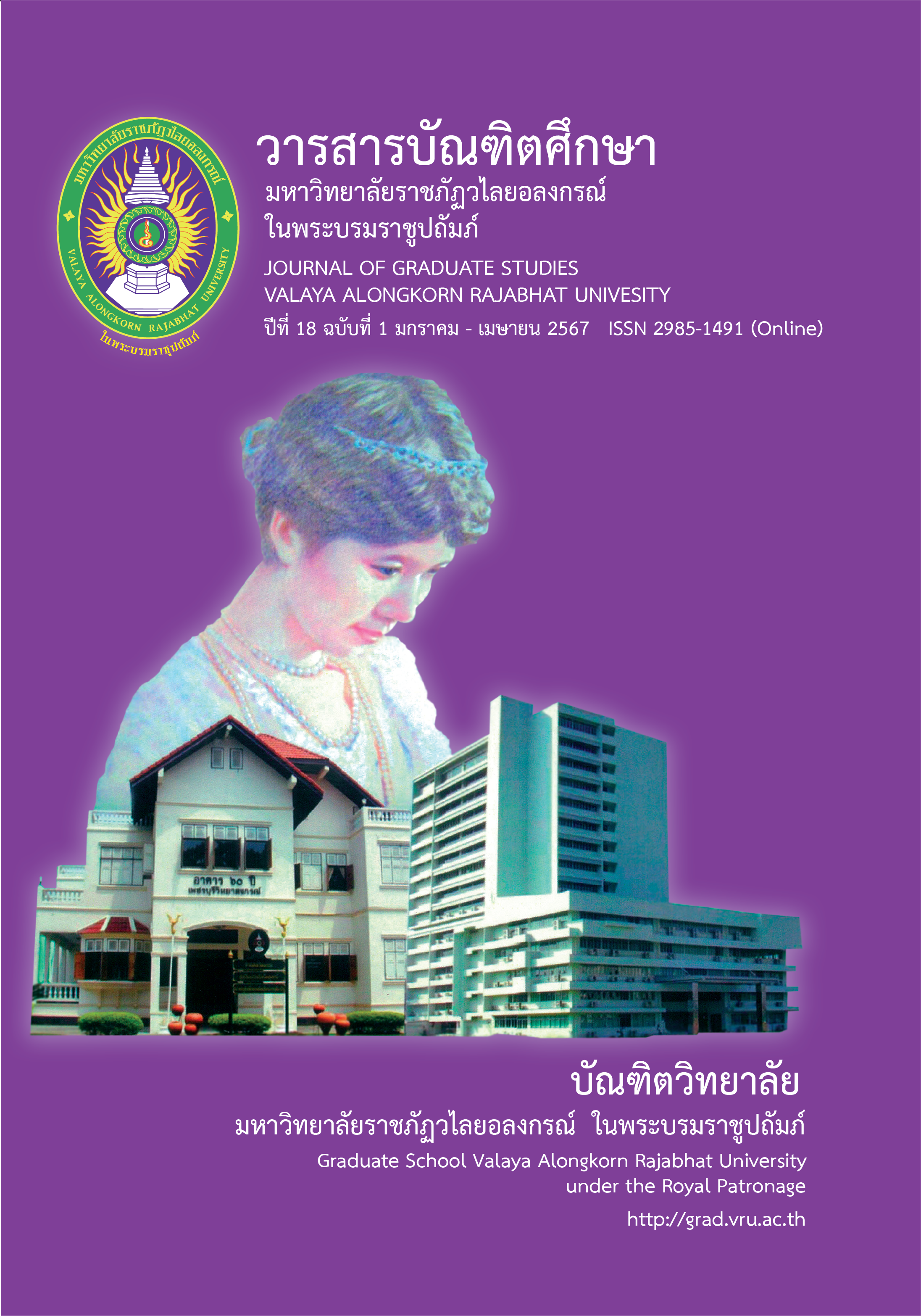STUDY OF LEARNING OUTCOMES FOR CURRICULUM DEVELOPMENT COURSE OF PROFESSIONAL TEACHER STUDENTS USING A HYBRID LEARNING
Main Article Content
Abstract
The purposes of this research were to 1) compare the learning outcomes of curriculum development courses of professional teacher students after receiving Hybrid Learning with the criteria of 70 percent of the full score, and 2) study the satisfaction of professional teacher students after receiving Hybrid Learning. The sample group was professional teacher students, Faculty of Education, Valaya Alongkorn Rajabhat University under the Royal Patronage of His Majesty the King. In the second semester of the academic year 2022, 1 room of 25 students, selected by a cluster random sampling. The research instruments used in this research were 8 lesson plans, 8 hours, the learning outcome test, used in this study is the learning measurement 60 items with reliability 0.87 and the satisfaction questionnaire has reliability was 0.85. The statistics used for data analysis was mean, standard deviation and t-test for one sample.
The research results found that: 1) The learning outcomes of curriculum development courses of professional teacher students after receiving the hybrid learning, higher than 70 percent of the full score criteria, at the 0.05 level of significance. And 2) the satisfaction study of professional teacher students after receiving the hybrid learning, the overall it was at the highest level ( = 4.73, SD = 0.64).
Article Details

This work is licensed under a Creative Commons Attribution-NonCommercial-NoDerivatives 4.0 International License.
บทความทุกเรื่องได้รับการตรวจความถูกต้องทางวิชาการโดยผู้ทรงคุณวุฒิ ทรรศนะและข้อคิดเห็นในบทความ Journal of Global of Perspectives in Humanities and Social Sciences (J-GPHSS) มิใช่เป็นทรรศนะและความคิดของผู้จัดทำจึงมิใช่ความรับผิดชอบของบัณฑิตวิทยาลัย มหาวิทยาลัยราชภัฏวไลยอลงกรณ์ ในพระบรมราชูปถัมภ์ กองบรรณาธิการไม่สงวนสิทธิ์การคัดลอก แต่ให้อ้างอิงแหล่งที่มา
References
Bamrungsetthapong, S., Tharnpanya, P. & Satjaharuthai, K. (2020). kān rīan kānsō̜n bǣp hai brit (Hybrid Learning) kap kānphatthanā khunnaphāp kānsưksā Thai nai satawat thī yīsipʻet [Hybrid Learning and the Quality Improvement of Thailand’s Education in the 21st Century]. Narkbhutparitat Journal Nakhon Si Thammarat Rajabhat University. 12(3), 213-224.
Bruning, R., Schraw, G., Norby, M. & Ronning, R. (2004). Cognitive psychology andinstruction (4th ed.). Upper Saddle River, NJ: Merrill/ Prentice Hall.
Juithong, S. (2023). kānsưksā phon kānrīanrū rāiwichā kānphatthanā laksūt khō̜ng naksưksā wichāchīp khrū dōi chai rūpbǣp kānčhatkān rīanrū bǣp hō̜ ʻong rīan klap thāng [Study of the learning outcomes in curriculum development course of teacher students by using the flipped classroom model]. Valaya Alongkorn Review Journal. 13(1), 203 - 215.
Juithong, S. (2019). khwāmphưngphō̜čhai khō̜ng naksưksā thī mī tō̜ ʻakān čhat kitčhakam kānrīanrū chœ̄ng phalit phāp rāiwichā lakkān čhatkān rīanrū Khana Kharusāt mahāwitthayālai rātchaphat wō̜ lai ʻAlongkō̜n nai phra bō̜rom rāchūpatham [The students of satisfaction toward study productive basd learning activities the course Principles of learning management, under greaduate Faculty of Valaya Alongkorn Rajabhat University under the royal patronage Pathum Thani Province]. Valaya Alongkorn Review Journal. 9(1), 31 – 46.
Klangphahol, K. (2018). rabīap withī wičhai thāngkān sưksā [Educational Research Methodology]. Pathum Thani: Valaya Alongkorn Rajabhat University under the Royal Patronage of His Majesty the King.
Kuhfeld, M. (2018). kān sūnsīa kānrīanrū nai chūang rưdū ra ʻon: sing thī rao rū læ sing thī rao kamlang rīanrū [Summer learning loss: What we know and what we’re learning]. Retrieved from www.nwea.org/blog/2018/summer-learning-loss-what-we-know-hat-were-learning
Lorico, D. S., et al. (2021). An effective blended online teaching and learning strategy druring the COVID-19 pandemic, Education for Chemica Engineers. 35(2021), 116–131. Retrieved from http:////www.ncbi.nlm.nih.gov/pmc/articles/PMC7847201/pdf.
Srisaard, B. (2011). kānwičhai bư̄angton [Preliminary Research]. (9th edition). Bangkok: Suwiriyasan.
Tangjityuenyong, D. (2022, March 18). hō̜ ʻong rīan yuk mai rō̜ng rap kānchai ngān bǣp Hybrid Learning [A new era classroom. Support for use Hybrid Learning]. AVL. https://avl.co.th/blogs/hybrid-learning/
Wongrattana, C. (2017). theknik kānsāng khrư̄angmư̄ wičhai: nǣothāng radap mư̄ʻāchīp [Research Tool Creation Techniques: A Professional Approach]. Bangkok: Chulalongkorn University Press.
Yaso, M. (2017). kānčhatkān rīanrū nai thotsawat thī yīsipʻet [21st Century Learning]. Retrieved from http://www.gotoknow.org/posts/542974/.


